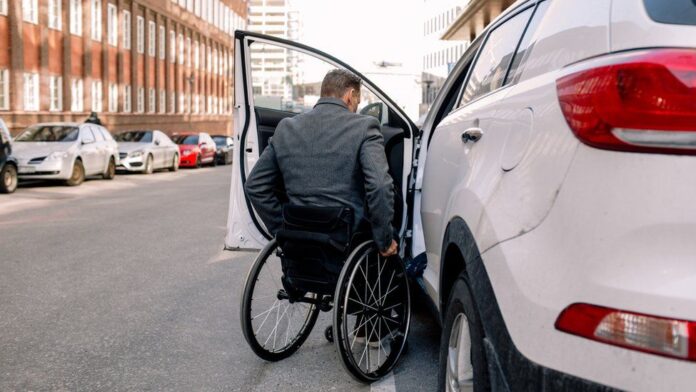
The US Justice Department (DoJ) is suing ride-hailing app Uber over allegations it has been overcharging disabled people.
The DoJ claims Uber’s “wait time” fees are discriminating against disabled passengers who need more than two minutes to get into a car.
It says Uber needs to comply with the Americans with Disabilities Act (ADA).
But Uber said wait time fees were not intended to apply to disabled riders and that it had been refunding fees.
Kristen Clarke, assistant attorney general for the DoJ’s civil rights division said the lawsuit aimed to send a “powerful message that Uber cannot penalize passengers with disabilities simply because they need more time to get into a car”.
Uber and other companies that provide transportation services “must ensure equal access for all people, including those with disabilities,” she added.
However, Uber said it disagreed that its policies were in violation of the ADA.
A spokesman said the company had been in talks with the DoJ before the “surprising and disappointing” lawsuit.
Wait time fees were “never intended for riders who are ready at their designated pickup location but need more time to get into the car”, he said.
Uber had a policy of refunding wait time fees for disabled riders whenever they alerted the firm that they had been charged, the spokesman said.
“After a recent change last week, now any rider who certifies they are disabled will have fees automatically waived,” he added.
Uber began charging passengers for driver waiting times in 2016.
The firm says riders are charged on average less than 60 cents, and that wheelchair-accessible trips or Uber Assist trips do not have any wait time fees by default.
It is not the first time that Uber has found itself in hot water over disability issues.
In April, it was ordered to pay a blind woman in San Francisco $1.1m after she was refused rides on 14 occasions. In the UK, Paralympic medallist Jack Hunter-Spivey said in September that Uber and other taxi drivers regularly drove off when they saw that he was a wheelchair user.
A 2020 study by the University of Tennessee found that it takes 28% more income for a disabled person in the US to achieve the same standard of living as a non-disabled person.
Maria Town, president and chief executive of the American Association of People with Disabilities (AAPD), who has cerebral palsy, told the BBC that disabled people often face a “disproportionate economic burden, often as a result of realities they cannot change nor control”.
In addition to higher costs for health care, medical supplies and accessibility tools, the practice of applying extra fees for services, such as grocery delivery or rideshare wait times, adds an additional “tax” for disabled consumers, she said.
Ending the practice of charging wait-time fees for disabled riders would be a “step in the right direction toward economic equality and dignity”, Ms Town added.
The AAPD said it had seen many cases where Uber drivers had driven away when they saw that the passenger was using a wheelchair, crutches, a walker or a service dog.
“The presence of disability alone sometimes is enough, it’s a huge issue,” Ms Town said, recalling an incident from 2017 concerning a man in Texas who had a genetic disorder that affected his appearance.
She also said that it was unfair of Uber to expect disabled people to use only its wheelchair-accessible services or Uber Assist.
“It’s not fair on a number of fronts – there’s a limited supply of these cars on the road, but also people with disabilities may not want assistance,” she stressed.
Forcing someone to take an assisted ride could cause “some tense driver-rider interactions that are completely unnecessary,” Ms Town said.
Source – BBC




